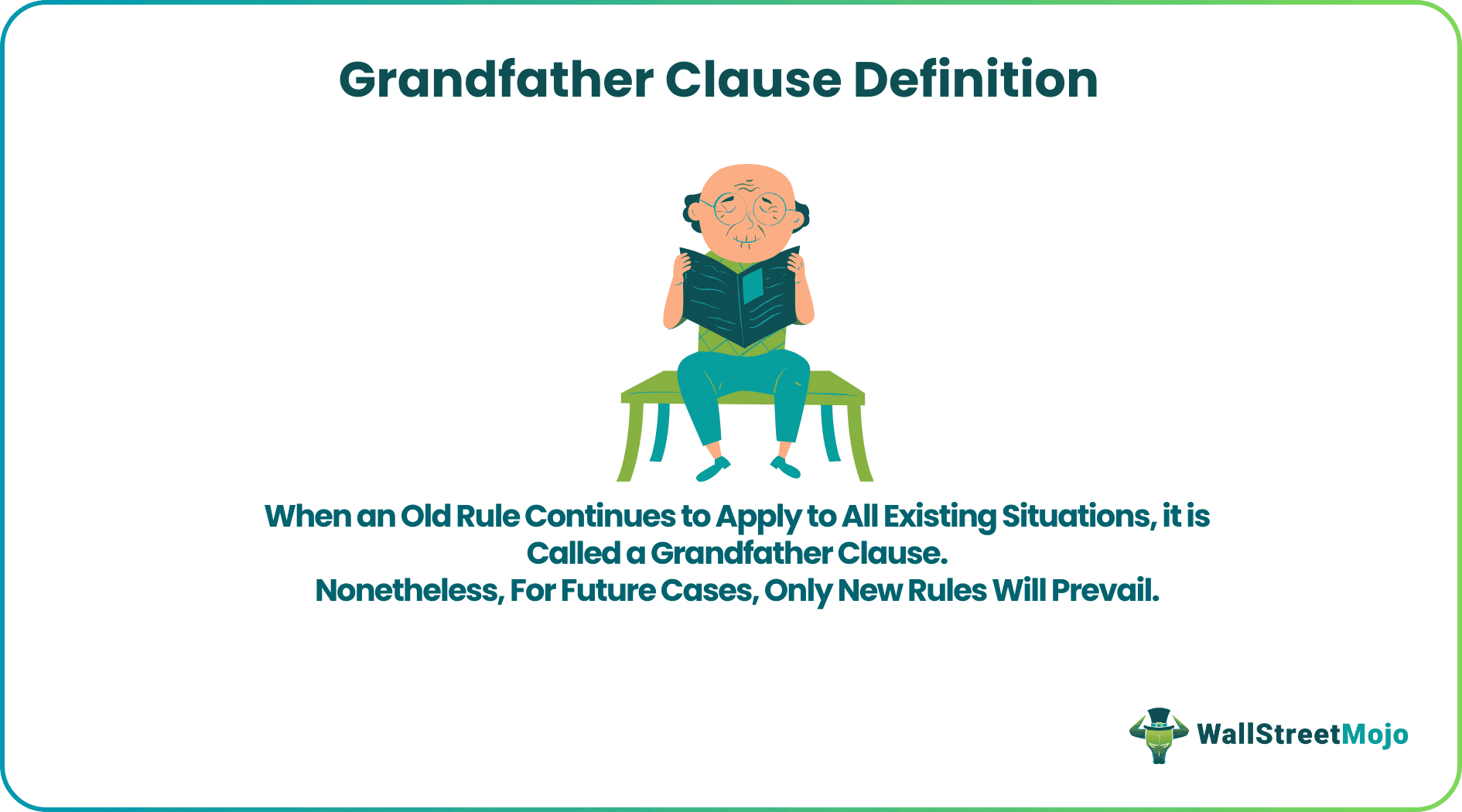Table Of Contents
Grandfather Clause Definition
The Grandfather clause allows people to exercise old rules even after introducing new regulations. It is also referred to as the legacy clause and can be exercised permanently or temporarily, depending on the particular scenario and applicable legislature.

The grandfather clause's history dates back to1890. The caveat is applied widely and is not confined to a particular sector or industry. The legacy clause is subject to certain limits; not every law can be challenged using this. Most grandfather exemptions are valid for a short period; eventually, newer laws prevail.
Key Takeaways
- The grandfather clause is a provision that allows entities, individuals, companies, and other authorities to exercise old rules even after the passing of new laws or amendments.
- It is also referred to as grandfathering. The history behind the law is muddled with racism, war, politics, real estate, and socio-economic issues.
- Constant rule changes can be burdensome to business owners and institutions. So, this clause is a like a grace period during the transition from old laws to new ones. But eventually, the latest legislation must prevail.
Grandfather Clause Explained
The grandfather clause allows people to follow old laws, even when a new law has been passed. It is also called the legacy clause. Grandfather clauses were designed to help people and entities operate freely—to provide flexibility. But the clause can be applied only for specific scenarios and for a limited period. If applied indefinitely, it would contradict the new laws and create chaos.
Economists condemn the grandfather clause, describing it as unfair, irrelevant, and a loophole. There are many instances where people take undue advantage of the legacy clause (for personal gain).
For example, in Canada, the grandfather clause applies to employment and work—a specific system of exemptions that apply to term and work-based laws. In addition, many countries have a certain grandfather clause income tax; investors and business owners use this clause for tax relaxations. Also, it makes tax filing easier.
History
In US history, the grandfather clause was a law used to discriminate against African Americans between 1895 and 1910. It was primarily exercised in seven southern states of the United States of America.
It stated that people allowed to vote before 1866 and 1867 were exempted from voting prerequisites like education, employment, and tax credentials. This way, African Americans were excluded from voting. This exemption benefitted everyone except formerly enslaved people who lacked educational qualifications.
The U.S. Supreme Court abolished the particular grandfather clause in 1915, declaring it unconstitutional. It was in direct contradiction with equal voting rights. The new voting rights act was introduced in 1965 by Lyndon Johnson. The U.S. Congress used this act to end discrimination against African Americans.
Examples
Let us look at some examples to understand how the exemption plays out in real-world scenarios.
Example #1
When Russia attacked Ukraine, NATO members condemned Russia, and Moscow imposed sanctions. But it was found that many of them, especially France and Germany, supplied arms to Russia covertly. They dispatched bombs, rockets, and missiles to Moscow.
France and Germany bypass the EU embargo on Moscow due to a loophole in the agreement—a grandfather clause.
But, applying the grandfather exemption to this scenario would mean that an agreement signed before the attack on Ukraine could be carried out. No new agreements have been made with Russia since 2014, but the embargo does not apply to old commitments.
Example #2
In 2019, a new scope clause was implemented in response to pilot contract demands. This clause reduced the seating capacity of American airlines.
But PSA airlines increased its current seats from 76 to 80, citing the legacy clause. The Federal Aviation Administration (FAA) certification is under process.
The new regulations apply to new jets. The existing seventy-six (76) CRJ 900 and E175 aircraft have been operating since January 7, 2013. Therefore, they are exempt from the latest scope clause restrictions using the legacy clause. The old law allows seventy-nine (79) and eighty (80) seats, respectively.
Grandfather Clause In Real Estate
The grandfather clause definition is crucial for real estate and property tax laws. Let us assume that Vanessa buys a home in a housing society where the laws are different, but with time, the committee members change.
The new committee members amended existing laws and even introduced new ones. The problem arises when Vanessa wants to avail benefits under old laws. Vanessa resorts to the legacy clause to apply a regulation that was previously valid but modified. Here, the legacy clause exempts Vanessa from abiding by new rules and guidelines.
Similarly, grandfather clause reconstruction rights help people build or renovate their homes without following updated guidelines.
In real estate, these exemptions are claimed very frequently. Be it housing societies, apartment buildings, colonies, driving spaces, house extensions, neighbor disputes, or land issues. But it is important to note that these exemptions are valid only for a short period. Eventually, new rules prevail. In the US, every state charts different grandfather laws and procedures.
